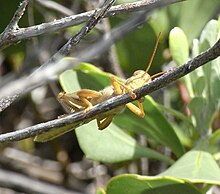User:Alaya3/sandbox
| Valanga irregularis | |
|---|---|

| |
| Valanga irregularis | |
| Scientific classification | |
| Kingdom: | |
| Phylum: | |
| Subphylum: | |
| Class: | |
| Order: | |
| Family: | |
| Genus: | |
| Species: | V. irregularis
|
| Binomial name | |
| Valanga irregularis (Walker, F., 1870)
| |
Valanga irregularis (common name "giant grasshopper", "giant valanga" or "hedge grasshopper") belongs to the Family of the Acrididae. The distribution resricts in the Australian tropics und subtropics. The species belong to the largest grasshopper of the continent. Usually the animal lives a solitary mode of life.
Description
[edit]Both sexes have a similar look but differ in their body size. The female individuals can reach up to 60 to 75 millimetre, males reach among 45 to 55 millimetre[1], hence they count as the largest grasshopper in Australia. Some reports refer a body length up to 90 millimetre.[2]
The body colour und pattern varies highly. Adults have a creamy brown to to greyish green colouring. The forewings show a black dots pattern, the hindwings are dark grey, sometimes also colourless or light green.[3]. At the tibia spines in orange or red colour with black sting are visible.
Distribution
[edit]
Valanga irregularis is native in the tropic and subrtopic regions of Australia, northward of Sydney.[2]
The species favours a moist climate. In the spring and autumn they are often found in grasland or forest area. But if the atmosheric conditons are ideal they leave for suburban gardens.[4]
Ecology
[edit]
Valanga irregularis feeds on shrubs, in particular Acalypha, Hibiscus or Bauhinia. Another food source are palm trees (Arecaceae).[1][4] They possess strong mandibles which are used to eat the plant from the leaf margin.[3] The feeding takes place all night long and they remain hidden behind branches during hot and rainy days.[5]
Adult individuals are good jumper and defend against predators like mantises (Mantodea) or lynx spiders with the spines on the hindlegs. Moreover, Valanga irregularis is well camouflaged as the body colour resembles the plant stem and leaf they are hiding behind.[3]
Valanga irregularis mostly lives solidary and does not form swarms. But under favourable conditions they may set up in small groups and may cause damage as for instance on young coffee berries.[2] But the species does not count as an ecological vermin.
Adults generally spend the winter months in their hideout but are not completely inactiv as they leave their lair from time to time for eating or sunbathing. The mating season begins in the first warm spring days. The males call the females with noises and they typically meet on the food supply.[3][5]
Development
[edit]
Each year one generation is bred. The life cylce adjusts to the wet and dry season in the tropics and subtropics. The eggs are deposited in the early summer and measure 5-6 millimetre. For oviposition the female drills a cylinder-shaped duct up to 90 millimetre into the moist soil. The clutch is deposited at the bottom of the duct and contains up to 150 eggs. The duct is then plugged with a frothy substanze to keep the eggs moist during the dry season.[2][3]
The initial 5 millimetre long nymphs hatch and leave the duct with the first heavy rainfall. In the next tree month they go through seven instar stages. In late summer and autumn the last moulting to become imagos takes place. The last instar stage resemble the imago in shape and appearance but are flightless.[3]
Systematic
[edit]
The species Valanga irreguluaris was first described by the British entomologist Francis Walker in 1870. The type specimen is still present in the collection of the Natural History Museum in London.[6]
The species name comes from the Javanese word "Valang" for grasshopper. The Latin byname "irregularis" means "irregular" and indicates the diversity of colour within this species.[5]
There are two known subspecies:[7]
- Valanga irregularis irregularis (Walker, 1870)
- Valanga irregularis signata (Sjöstedt, 1921)
Refferences
[edit]- ^ a b "Giant Grasshopper". Australian Insects. Retrieved 2016-04-07.
- ^ a b c d "Giant grasshopper". Queensland Government: Deparment of Agriculture and Fischeries. Retrieved 2016-04-07.
- ^ a b c d e f "Giant Grasshoppers - The largest grasshopper - Valanga irregularis". Brisbane Insects. Retrieved 2016-04-07.
- ^ a b "Grasshoppers and Locusts". Queensland Museum. Retrieved 2016-04-07.
- ^ a b c "Life and Adaptations to Water - Giant grasshopper". South Australian Museum - Wayback Machine (Internet Archive). 2009-10-17. Retrieved 2016-04-07.
- ^ Francis Walker (1870), Catalogue of the Specimens of Dermaptera Saltatoria in the Collection of the British Museum. Part III (in German), London: British Museum, pp. 425–604
- ^ "Valanga irregularis (Walker, 1870)". Global Biodiversity Information Facility. Retrieved 2016-04-07.
Further reading
[edit]- CSIRO, Division of Entomology (1991), Insects of Australia (in German), Melbourne University Press, ISBN 0522846386
- David C. Rentz (Oktober 1996), Grasshopper Country – the Abundant Orthopteroid Insects of Australia (in German), UNSW Press, ISBN 0868400637
{{citation}}: Check date values in:|year=and|date=(help)CS1 maint: date and year (link) CS1 maint: year (link) - David C. Rentz; R.C. Lewis; Y.N. Su; M.S. Upton (2003), A Guide to Australian Grasshoppers and Locusts (in German), Malaysia: Natural History Publications, ISBN 983812074X
